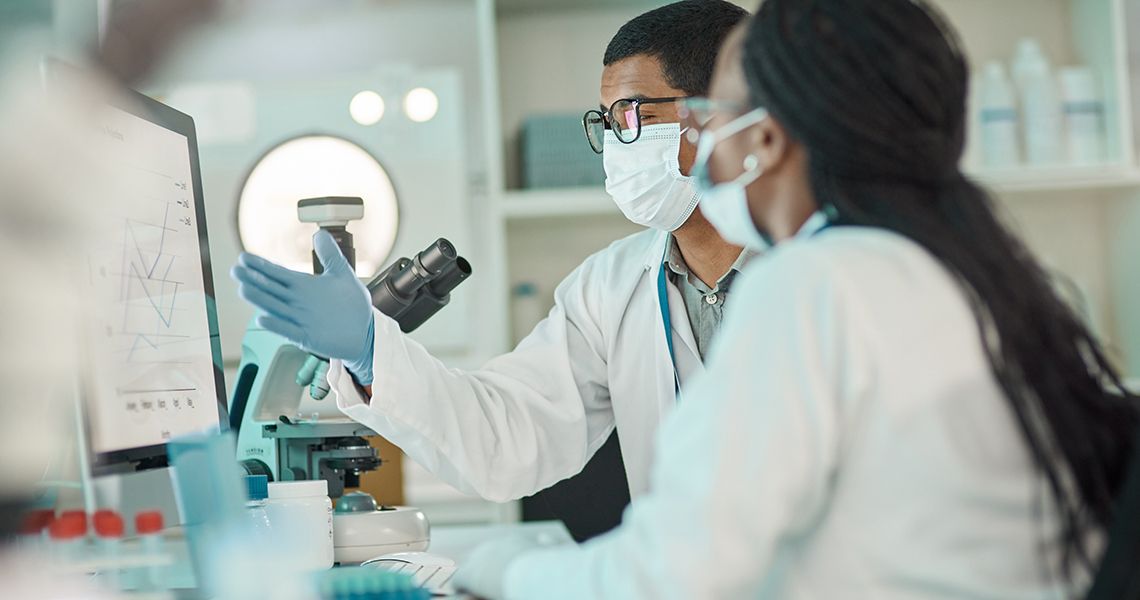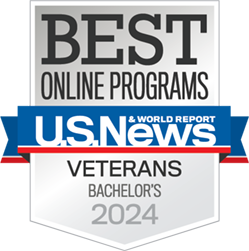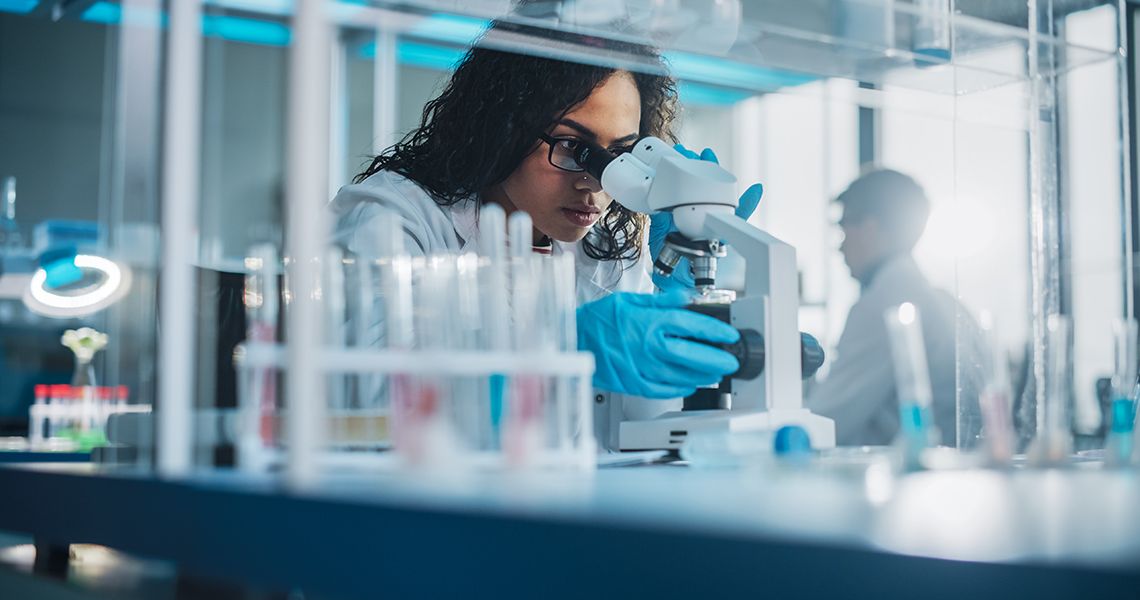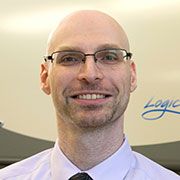
Assist Physicians in More Precise Diagnoses
Online Coursework
12 Months
The George Washington University’s (GW) online Post-Baccalaureate Certificate in Clinical Chemistry for Medical Laboratory Science is designed to provide the knowledge and hands-on skills you need to become a certified technologist in clinical chemistry.
You’ll learn how to use chemistry to evaluate patient health, study DNA, and examine tissue, along with developing laboratory procedures that help physicians make earlier, more precise patient diagnoses and determine treatment.
To learn more about our programs, you can register for our upcoming events.
Program Highlights
- 100% online coursework, no visits to campus required
- Qualify to sit for the ASCP Technologist in Chemistry (C) exam*
- The certificate consists of 19 credit hours and can be completed in 1 year
- Applicants with clinical laboratory experience may be eligible to waive individual clinical practicum requirements
- Qualify for the ASCP Chemistry exam
- Accredited by the National Accrediting Agency for Clinical Laboratory Sciences (NAACLS)
Program Outcomes
When you will complete the Post-Baccalaureate Certificate in Clinical Chemistry for Medical Laboratory Science you will be ready to:
- Apply principles of traditional and molecular laboratory procedures to perform diagnostic analyses
- Correlate laboratory data and quality control data to assess patient test results
- Apply knowledge of laboratory science principles as they relate to human disease diagnosis
- Comply with laboratory safety regulations and regulatory policies
- Apply ethical decision-making to issues related to clinical laboratory practice
Request Information
* Indicates required field
- Read: Privacy Disclaimer Acknowledgment
-
By submitting your contact information, you are providing your express consent authorizing GW and GW's representatives to contact you by email, phone, or text (including the use of an automatic dialing system). Standard text messaging and/or data rates may apply.
If you do not provide your contact information (phone and email), we may not be able to provide you with the information you requested.
If you provided your contact information but no longer wish to receive phone calls, emails, or text (SMS) messages from GW, you will have the option to opt-out. Emails and Text messages will include details for unsubscribing/opting out. To opt out of receiving phone calls from GW, contact us via email at info [at] hsprograms [dot] gwu [dot] edu (info[at]hsprograms[dot]gwu[dot]edu) or text/ call: 202-792-2819.
By submitting your information via this form, you also confirm that you have read and understood the GW Statement of Privacy Practices.
Note that the consent requested above is not required for enrollment in GW's programs. If you do not consent to providing the information requested on this form, you may contact us via email at info [at] hsprograms [dot] gwu [dot] edu (info[at]hsprograms[dot]gwu[dot]edu) or text/ call: 202-792-2819.
Accreditation and Rankings
- GW is accredited by the Middle States Commission on Higher Education
- #62 Best National University*
- #13 Best Online Bachelor's Programs*
- #7 Best Online Programs for Veterans*
* The U.S. News & World Report – 2024 Rankings



Curriculum
The Post-Baccalaureate Certificate in Clinical Chemistry for Medical Laboratory Science consists of five, three-credit courses and concludes with a four-credit practicum. Applicants with clinical laboratory experience may be eligible to waive individual clinical practicum requirements.
You will explore immunology and serology, clinical biochemistry, molecular diagnostics, and laboratory management and put your new skills to work in a real-world environment.
You can complete this program in as little as one year and qualify to sit for the ASCP Technologist in Chemistry (C) exam.
Who Is the Ideal Student for This Program?
Clinical chemists are strong critical thinkers and can handle tasks that require precise manual dexterity. They work well under supervision while performing routine tests and research to develop new testing methods. They pay great attention to detail to help detect human and mechanical errors, like incorrectly recorded results, and work diligently to resolve those errors or problems during testing.
This certificate program is best for those who have successfully completed a bachelor’s degree, typically in a science such as biology, chemistry, or microbiology, and want to pursue the laboratory science profession without completing another bachelor’s degree. There will also be a clinical rotation requirement in your geographical area to complete this program.
Career Outlook
Clinical chemists can work in a variety of laboratory settings:
- Hospital laboratories or clinics
- Manufacturing laboratories
- Commercial or reference laboratories
- Pharmaceutical companies
The Bureau of Labor Statistics projects an increase in the aging population will lead to a greater need to use laboratory procedures to diagnose medical conditions, such as cancer or type 2 diabetes.
Overall employment of medical laboratory technologists and technicians is expected to grow 11% from 2018 to 2028, faster than the average for all occupations, with a median salary of $52,330 per year.1
Admission Requirements
To be accepted into this program, you must have:
- Completed application
- Cumulative and Science GPA of 2.5 or above on a 4.0 scale
- Bachelor’s degree
- Resume/CV
- Personal statement
- One letter of recommendation
Tuition Details
The Post-Baccalaureate Certificate in Clinical Chemistry for Medical Laboratory Science program at GW consists of 19 credit hours. Please find the cost per credit hour and total estimated program costs here.
Note: Tuition rates are subject to change and additional fees may vary by program.
Meet the Program Director

GW’s experienced faculty provide you with the rich, practical knowledge and support needed for you to succeed in the program and in your career.
Cliff Cymrot, DHSc, MHA, MLS (ASCP)CM, SHCM, MT (AAB), MT (AMT)
- Read Full Bio
-
Dr. Cliff Cymrot is the current Program Director for Medical Laboratory Sciences (MLS) and has over 10 years of experience in combined teaching and clinical laboratory practice. In addition to his program director duties, Dr. Cymrot teaches a range of courses within the MLS program, both online and face-to-face, such as Hematology lecture and lab, Bacteriology lab, Immunohematology lab, and Molecular Diagnostics, and Capstone.
Prior to his arrival at George Washington University (GW), Dr. Cymrot worked as a medical laboratory technician at a medium-sized, 200-bed hospital in upstate NY. In 2008, Dr. Cymrot worked for Advance Magazine for Laboratory Professionals providing storylines for the comic strip “Lab out Loud” that he worked on with his brother-in-law. He has also been a contributor for several chapters in the Textbook of Diagnostic Microbiology by Mahon, Lehman, and Manuselis, as well as having various research publications.
He is also a member of the DC chapter for the American Society for Clinical Laboratory Science (ASCLS), American Medical Technologists (AMT), and the American Association of Bioanalysts (AAB). He also holds certifications in ASCP, AMT, and AAB in Medical Laboratory Science, and Specialist in Hematology.
In 2010, he earned his B.S. in Medical Technology from the University of Cincinnati (UC). He was then promoted to medical laboratory scientist and soon after began working as an adjunct instructor for SUNY Orange teaching Microbiology for Health Professionals, Fundamentals of Anatomy and Physiology, and Certification Preparation. In 2014 he earned his a master’s degree in Health Administration from UC.
After graduation, he received an offer to facilitate an online graduate level course in health systems management at UC. In 2015 he was offered a position at GW to teach all of the laboratory courses in the newly created BSHS in MLS blended/hybrid program. After three years he was offered the Program Director position for the undergraduate MLS program here at GW. In 2022 he then went on to complete his doctorate in health sciences at GW. In 2024 he was offered the Program Director position for the MSHS in Laboratory Medicine program here at GW. Dr. Cymrot is actively involved in the MLS profession and loves teaching, research, and promoting MLS.
NAACLS Program Accreditation
The Medical Laboratory Science Program is accredited by the National Accrediting Agency for Clinical Laboratory Sciences (NAACLS).
NAACLS
5600 N. River Rd., Suite 720
Rosemont, IL 60018-5119
847.939.3597, 773.714.8880, 773.714.8886 (fax)
Email: info [at] naacls [dot] org (info[at]naacls[dot]org)
Website: www.naacls.org
Sources:
- U.S. Bureau of Labor Statistics (2019 September 4). Clinical Laboratory Technologists and Technicians. Occupational Outlook Handbook. Retrieved February 20, 2020, from https://www.bls.gov/ooh/healthcare/clinical-laboratory-technologists-and-technicians.htm
* Since each state may have different requirements for licensure, each student is encouraged to contact their state’s regulating agency and review these requirements prior to beginning any degree program. States requiring licensure may require extended duration of practicum experiences, additional academic courses (outside the student’s program of study), etc. These additional requirements may require you to take a course or courses outside of GW.
In particular, New York and California have additional requirements for state licensure. Both NY and CA require extended times for practicum rotations. Please also be aware that the fully online post-baccalaureate certificate programs do not meet the student lab requirement for NY state licensure. Also, for those applying to the fully online post-baccalaureate categorical certificates in hematology, microbiology, blood banking, and chemistry, the state of New York does not provide licensure for categorical certification (e.g., Technologist in Microbiology, Technologist in Blood Banking, etc.). We recommend that students who live in New York or California or plan to relocate to New York or California do research to determine the NY and CA licensure requirements.
National Accrediting Agency for Clinical Laboratory Sciences (NAACLS)
5600 N River Road, Suite 720
Rosemont, IL 60018-5119
Curriculum Details
19 TOTAL CREDITS REQUIRED
The Post-Baccalaureate Certificate in Chemistry for Medical Laboratory Science requires completion of 19 credit hours. Coursework is 100% online with in-person clinical practicum. Students with clinical laboratory experience may be eligible to waive individual clinical practicum requirements. Completion of the certificate qualifies the graduate to take the Technologist in Chemistry examination offered by national certifying agencies.
Core
- MLS 4141 Immunology and Serology (3)
-
Principles of the immune system’s components, functions, interactions with microorganisms, and the clinical applications of immunologic assays to human health and disease.
- MLS 4145 Clinical Biochemistry I (3)
-
This course studies the methodologies employed in the chemical analysis of human blood and body fluids. This includes an examination of the fundamentals of measurement and the principles of instrumentation as they relate to the assay of each analyte studied. Also, the laboratory results are correlated with clinical significance and pathophysiology, which may generate changes in the analyte. Throughout the course, the quality assurance measures required to ensure the reliability and validity of the laboratory results will also be emphasized.
- MLS 4146 Clinical Biochemistry II (3)
-
This second course in clinical biochemistry continues the study of the measurement and interpretation of chemical constituents in human blood and body fluids. The laboratory results of each analyte are correlated with the clinical significance and pathophysiology which may generate changes in the analyte. Throughout the course, the quality assurance measures required to ensure reliability and validity of the laboratory results will also be emphasized.
- MLS 4151 Molecular Diagnostics (3)
-
Introduction to the molecular techniques used to diagnose human disease; technology, theory, and methodology of specific molecular protocols that can be used within a clinical laboratory setting to aid in disease diagnostics including those of genetic, oncogenic, and infections origin.
- MLS 4158 Laboratory Management and Operations (3)
-
Introduction to critical concepts of lab management, including leadership theory, management principles, human resource management, financial management, quality management, and laboratory operations.
- MLS 4161 Clinical Biochemistry Practicum (4)
-
Application of the medical knowledge and clinical skills gained in the didactic clinical biochemistry I and clinical biochemistry II courses. Proctor fee.
Key Dates
|
Summer 2026 |
|
| Application Deadline |
March 20, 2026 (Open) |
Admissions Requirements
To be accepted into the Post-Baccalaureate Certificate in Chemistry for Medical Laboratory Science program (online coursework), you must have:
| Completed Application |
| Cumulative and Science GPA of 2.5 or above on a 4.0 scale |
| Bachelor’s degree |
| Resume/CV |
| Personal statement: Applicants must include a 250–500 word essay describing your reasons for undertaking study at GW, your academic objectives, career goals, and related qualifications including collegiate, professional, and community activities relevant to your program of interest. Include any substantial accomplishments not already mentioned on the application form. |
|
One letter of recommendation Letters of recommendation should be from:
Recommender will submit a letter on letterhead with a signature and credentials/contact information via the application portal. |
| Application fee: A non-refundable application fee of $80 is required. The application fee is waived for active-duty U.S. military, current GW students, degree-holding GW alumni, current McNair Program Scholars, and graduates of minority-serving institutions (MSI). |
| Official transcripts from every college and university attended. All non-U.S. transcripts (including those in English) must be evaluated by an accredited foreign credential agency. Please find the list of member organizations here: https://www.naces.org/members. |
|
Completed coursework: All required courses must be completed with a C grade (C- grades and lower do not transfer) or better at a regionally accredited institution of higher learning:
|
| Students who live outside of the Washington, D.C., metro area are required to secure a satisfactory clinical site at the time of admission. |
| Review the Criminal Background Check and Drug Screening Policies in the Health Sciences Programs Bulletin |
| Post Matriculation Requirements: Copy of criminal background check Copy of drug screening test Prior to Clinical Rotations: Physical exam with clinician sign-off of Essential Functions Form Immunization records, including PPD (within the past 12 months) and evidence of Hepatitis B, MMR, Varicella, Diphtheria, Polio and Tetanus vaccination Copy of health insurance |
| Since each state may have different requirements for licensure, each student is encouraged to contact their state’s regulating agency and review these requirements prior to beginning any degree program. State’s requiring licensure may require extended duration of practicum experiences, additional academic courses (outside the student’s program of study), etc. These additional requirements may require you to take a course or courses outside of GW. In particular, New York and California have additional requirements for state licensure. Both NY and CA require extended times for practicum rotations. Please also be aware that the fully online post-baccalaureate certificate programs do not meet the student lab requirement for NY state licensure. Also, for those applying to the fully online post-baccalaureate categorical certificates in hematology, microbiology, blood banking, and chemistry, the state of New York does not provide licensure for categorical certification (e.g., Technologist in Microbiology, Technologist in Blood Banking, etc.). We recommend that students who live in New York or California or plan to relocate to New York or California do research to determine the NY and CA licensure requirements. |
NOTE: This program is authorized, exempt, or not subject to state regulatory compliance and may enroll students from all 50 states, U.S. territories and the District of Columbia.
International Students
Effective Fall 2025
International students should check with individual programs regarding eligibility for visa sponsorship. Generally, online and hybrid programs are not eligible for student visa sponsorship from GW. This would include transfer students from any other institution with an existing visa. To be considered for admission, there are required scores that you will need to meet. Score requirements may differ by school and program so check the admissions requirements for your program.
Applicants who have not completed a post-secondary degree from an institution where English is the sole language of instruction are required to submit TOEFL, IELTS, PTE Academic, or the Duolingo English Test scores to be considered for admission. The following are the minimum scores for admission consideration:
- TOEFL: 600 on paper based, 250 on computer-based, or 100 Internet-based,
- PTE: overall score of 68,
- IELTS: an overall band score of 7.0, with no individual band score below 6.0
- DET overall score of 120.
Undergraduate applicants who meet one of the following conditions may be considered for admission without submitting TOEFL, PTE or IELTS or DET scores:
- You have earned an associate’s degree or higher from an institution where English is the sole language of instruction
- You are a citizen of an English-speaking country
Scores may not be more than two years old. To ensure TOEFL scores are sent to GW, use institutional code 5246. An institutional code is not required to send IELTS or PTE scores to GW. DET scores must be submitted via the Duolingo English Test system directly to GW.
Based on the results of your English Proficiency exam results and your application, you may be required to take English for Academic Purposes (EAP) during your first year of study at GW. Please note that GW evaluates each application holistically so applicants may still be recommended for EAP even if they meet the requirements for exemption. Students placed in EAP courses should anticipate additional tuition expenses as well as possible extension of time needed to complete their degree programs.
Official transcripts from institutions outside the U.S. must be accompanied by an official transcript evaluation from an accredited independent evaluating agency. Please be sure you request a detailed evaluation that includes all course titles, credit hours, grades, U.S. degree equivalency, grade-point averages (GPA), and date of degree conferral (course by course evaluation). For a list of acceptable foreign credential evaluation services, please visit NACES.
Supporting documents not submitted online should be mailed to:
Mail: George Washington University
ATTN: Transcript Processing Center
1415 W 22nd St.
Suite 220
Oak Brook, IL 60523
Alternatively, official electronic transcripts can be sent to: transcripts [at] hsprograms [dot] gwu [dot] edu (transcripts[at]hsprograms[dot]gwu[dot]edu)